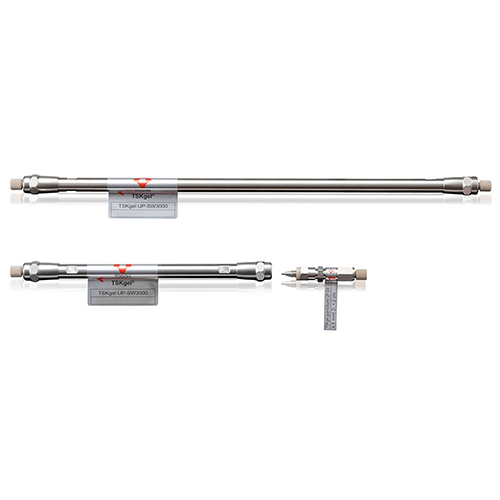Description
TSKgel SW columns, introduced in 1977, have become synonymous with analyzing protein molar masses in the field of biotechnology.
TSKgel SW columns are based on highly porous silica particles, the surface of which has been shielded from interacting with proteins by derivatization with ligands containing diol functional groups. TSKgel SW columns stand out from other silica- or polymer-based high performance size exclusion columns by virtue of their large pore volumes.
TSKgel column line for (U)HPLC-SEC:
- UP-SW2000 (working range: 5 – 150 kDa) for the analysis of smaller mAbs, Fabs, peptides and oligonucleotides
- UP-SW3000 (working range: 10 – 500 kDa) for analysis of mAb monomer and antibody fragments
- UP-SW Aggregate (working range: 10 – 2.000 kDa) for the analysis of larger proteins and high order mAb aggregates
TSKgel UP-SW2000
TSKgel UP-SW2000 columns are designed for the analysis of small proteins, peptides and oligonucleotides. The columns are packed with 2 μm silica-based beads shielded with a hydrophilic diol-type bonded phase that prevents the silica surface from interacting with protein samples.
TSKgel UP-SW2000 columns feature the same pore size as the well-established TSKgel SuperSW2000 columns. Hence methods developed using TSKgel SuperSW2000 columns can easily be transferred to TSKgel UP-SW2000 columns on conventional HPLC systems as well as on UHPLC systems.
TSKgel UP-SW2000 columns offer higher resolution, improved peak shape and increased efficiency yielding methods that are robust, reproducible and easily transferrable between UHPLC and HPLC systems.
TSKgel UP-SW2000 columns offer superior reproducibility injection-to-injection, from column-to-column within the same lot and from lot-to-lot. %RSD values for peak parameters including retention times, area peak height, peak asymmetry, and theoretical plate count demonstrate the exceptional reproducibility of these columns.
TSKgel UP-SW3000
TSKgel UP-SW3000 silica-based GFC columns are packed 2 μm particles, providing high efficiency UHPLC separations of proteins. The 25 nm pore size results in a fractionation range up to 500,000 Da for globular proteins. These UHP-SEC columns are ideally suited for the analysis of antibodies, their fragments, and aggregates in biopharmaceutical R&D or QC analysis. They feature the same pore size as TSKgel SWXL, the current industry’s gold standard for QC analysis of therapeutic antibodies. Thus, the new UP-SW UHPLC columns allow a smooth method transfer from HPLC to UHPLC.
It is important to employ an UHPLC system to take full advantage of the high efficiency that can be obtained on TSKgel UP-SW columns. The columns can also be used with an HPLC system that is optimized with regards to extra-column void volume but maximum plate numbers will not be achieved with HPLC instruments.
TSKgel UP-SW Aggregate
TSKgel UP-SW Aggregate, the latest addition to the UP-SW series of silica-based size exclusion chromatography (SEC) columns, are specifically designed to facilitate the analysis of mAb aggregates, high molecular weight (MW) proteins and nucleic acids. These columns are 3 µm, 30 nm pore size SEC analytical columns that have been designed with a higher exclusion limit than other TSKgel UP-SW columns.
Available in 4.6 mm ID, TSKgel UP-SW Aggregate columns are compatible with both UHPLC and HPLC systems and require less sample while delivering higher sensitivity compared to the 7.8 mm ID TSKgel UltraSW Aggregate column. These columns feature high pore volume per unit column volume, low sample adsorption (due to the derivatization of the particle surface with ligands containing diol functional groups) and excellent column efficiency, all contributing to unsurpassed sample resolution.
For more details and price, please contact MD Scientific at info@md-scientific.dk or 7027 8565.

